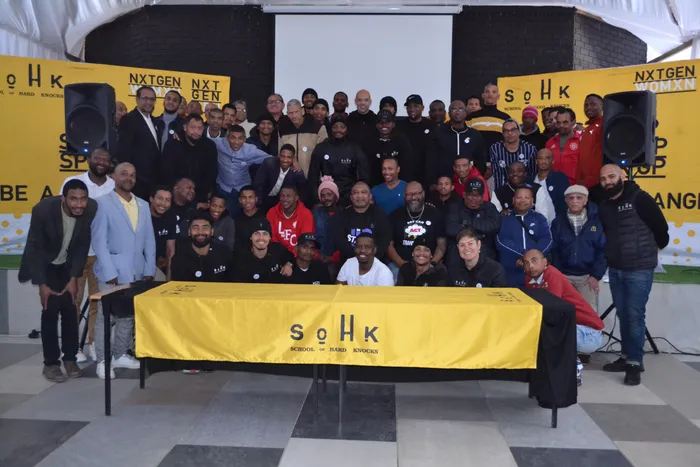Changing the Game: Men stepping up against gender-based violence

SoHK and its partners and participants stood together in agreement to ending GBV. It was agreed that GBV is not solely a woman’s struggle.
Image: Supplied
“What is the role of men in South Africa’s persisting gender-based violence (GBV) crisis?”
This was the central question at the inaugural Men’s Conference hosted by the School of Hard Knocks (SoHK) in Strandfontein last week.
Deliberately held during Women’s Month, the conference aimed to challenge men to confront harmful ideas of masculinity and take responsibility for breaking cycles of violence.
The initiative forms part of SoHK’s Project #NxtGenMen, supported by the Irish Embassy, which uses sport and mentorship to shift gender norms and promote healthier relationships.
“Too often, it is women who are expected to speak out and drive change,” said SoHK chief executive Lana Rolfe. “We need to create spaces where men interrogate their behaviours and commit to being part of the solution.”
Since 2022, NxtGenMen has grown from working with 140 men to more than 5 000 across several provinces, supported by 260 trained facilitators running workshops in their communities.
Testimonies at the conference revealed that many men carry unspoken pain and confusion about their roles, which can manifest in harmful ways. Men of all ages shared personal struggles and reflections. “Being a man is not about domination,” one participant said. “It’s about respect and responsibility.”
The opening session, led by Lali Mili from Langa, focused on “Exploring the Myths of Masculinity.” Participants reflected on messages they grew up with, such as “men don’t cry” and “a man must always provide.” “That silence is killing us – and it’s killing women too,” one attendee said, adding that safe spaces for men to talk were vital.
Discussions also explored how redefining masculinity could reshape homes, schools, and workplaces. The attendees agreed that when boys understand that vulnerability is not weakness, society becomes safer and healthier.
Wilfred Mackay shared his personal journey: “I went through many programmes before, but this one helped me learn things about myself that I never realised. I had to confront patterns I didn’t even know were there – and that’s when change became possible.”
Men also discussed challenges in maintaining healthy relationships, especially in communities affected by poverty and crime. Ashtivon Jansen, a 23-year-old from Hanover Park who left gangsterism behind, said: “You need to open up, even when it’s hard. That’s what makes the difference.”
Collin Engelbrecht said the conference was transformative: “I came here because I want to be a game changer. Too many men are going down the wrong path, but every one of us has a chance to change.”
Fatherhood and the legacies men leave behind were recurring themes. One participant spoke of his estranged relationship with his son: “For three years, my boy refused to speak to me. But we have worked through it, rebuilt our relationship, and now we’re even collaborating professionally. That’s the kind of healing we need in families.”
Motivational speaker Albert Matthews called on men to see themselves as “game changers” who interrupt cycles of harm. “We don’t need perfect men,” he said. “We need present men who choose every day to change the game instead of the game changing them.”
The conference speakers also called for men to become “interrupters” – those willing to step in when violence or harmful behaviour surfaces. “As men, we need to stop being bystanders,” one facilitator said. “Sometimes being a game changer is about stopping something small before it grows. If you see abuse, speak up.”
Ethan Barlow said: “I’ve learned tools to become wiser and to step up. Real strength is about protecting, listening, and building.”
Mr Rolfe said that for SoHK and its partners, the ultimate goal was cultural transformation. “Imagine the next generation of South Africans growing up in a society where mutual respect, accountability, and compassion between men and women is the norm. That’s the vision, but it will only happen if men are willing to do the work now.”
As the conference closed, participants agreed that GBV is not solely a woman’s struggle – it is a men’s issue too. “Enough is enough,” said Mr Matthews. “We don’t need perfect men. We need present men who choose every day to change the game instead of the game changing them.”
Related Topics: